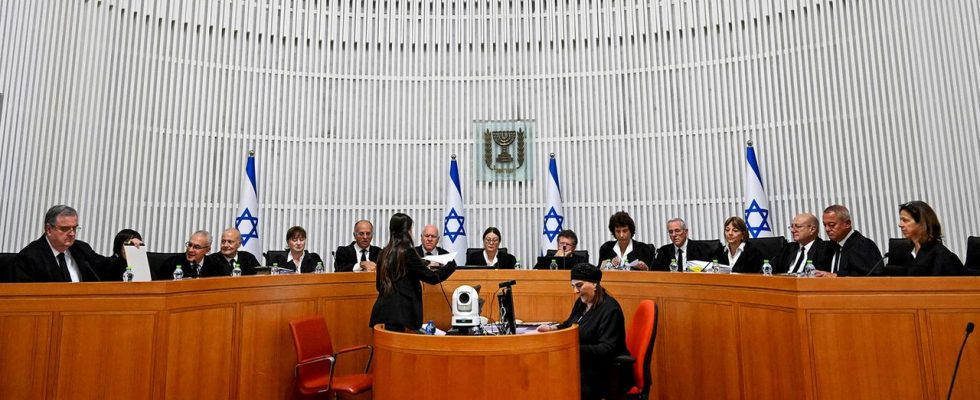There have been protests against judicial reform in Israel for months. Today the Supreme Court is hearing about it for the first time. Parliament Speaker Ohana started the hearing with a warning to the judges.
People in Israel have been protesting against judicial reform for 36 weeks. Today, Tuesday, the judiciary is dealing with the issue for the first time: The Supreme Court against Parliament and against the government.
Parliament President Amir Ohana set the tone at a specially called press conference: “The Knesset will not tolerate being trampled on. I stand before you in my capacity as Parliament Speaker and in this capacity I advise the Court and its judges to to recognize the limits of their power. In a democracy, no institution is all-powerful.”
Are the judges impressed?
Whether the 15 supreme judges, who are meeting in full for a hearing for the first time in Israel’s history, will be impressed by this is being discussed excitedly across the country.
The core of the discussion is the so-called appropriateness clause. This was repealed at the end of July with the majority of right-wing religious parties as part of the judicial reform. This deprived the chief justices of the ability to classify decisions and laws as inappropriate and declare them invalid.
The new law, i.e. the abolition of the adequacy clause, was designated as a basic law by the right-wing religious majority, according to which it practically has constitutional character. But eight petitions were submitted against it, which the supreme judges now have to decide on.
The supreme judges have never repealed a basic law in Israel. The right-wing national finance minister Bezalel Smotrich, as the leader of a demonstration in front of the courthouse in Jerusalem, made it clear that it should remain that way: “The laws of the Knesset are the laws of the people. Nobody is entitled to abolish the basic laws of the people, nobody is entitled to do so To silence the voice of the people, no one must silence your voice, because you voted right and you received right.”
It is unclear whether the government would comply
Constitutional experts say today’s hearing is one of the most important legal cases in Israel’s history. Because it is completely unclear whether the government and especially Prime Minister Benjamin Netanyahu would bow to a decision by the Supreme Court.
This is also why President Isaac Herzog is constantly trying to get the parties to reach a compromise: “For nine months we have been in a deep crisis that has a dramatic impact on our lives, that significantly affects our security, our economy, our society and our interpersonal behavior. “It’s enough, enough! We have to come together and bring about a broad agreement.”
Decision only in a few weeks
But his proposal to revise the passed law and put the judicial reform on hold for a year and a half has so far not met with approval within the government’s ranks. Netanyahu has repeatedly emphasized that he is willing to compromise and – as he puts it – to listen to the public pulse. But so far there have been no concrete steps to change the judicial reform. Even if the media recently reported that Netanyahu wanted a unilateral weakening of the law without the consent of the opposition.
Many accuse Netanyahu of just playing for time. The chief justices will also have to take this into account: a decision on the petitions, which will be discussed today by the entire panel of judges and broadcast live on national television, will not be made for a few weeks at the earliest.

